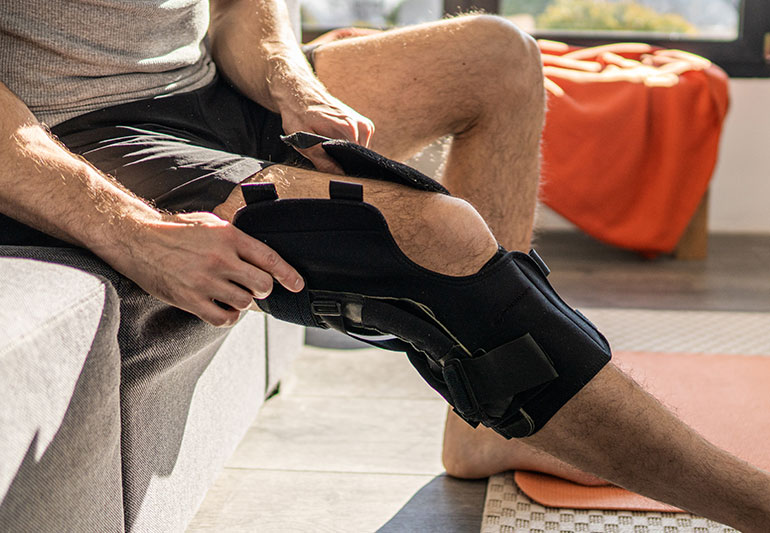

If your provider has recommended a medical or sports brace for an injury, you might be wondering how often to clean it and how to take care of it.
Athletic trainer Brian Warner answers questions about how to maintain braces properly to keep them smelling fresh and looking clean.
Q: Besides keeping odor away, why is it important to clean braces?
A: Depending on what kind of brace you have; a medical or athletic brace can be rather costly. Maintaining and cleaning it will help extend its life.
Also, when you don’t clean braces regularly, they not only start to smell bad, but they also can sometimes cause health problems, such as folliculitis, ringworm and even staph infections.
Q: Can leaving a brace on for too long create problems?
A: Yes. Wearing a brace will increase your body temperature in that region, causing moisture to accumulate. Over time, this can cause skin deterioration. If you’re not being active, you should take the brace off to allow your skin and the brace to dry out.
Knowing which type of brace, you have, and when it makes sense to wear it, is important. Not every brace needs to be worn all the time. Of course, you should always follow the recommendations of the healthcare professional who prescribed the brace to you. Contact your provider if you have questions about when you should or shouldn’t wear the brace.
Q: How often should you clean your brace?
A: It depends on the type of brace and the activities you engage in. For a simple sleeve or brace without metal components, it’s probably safe to launder every few days. For a larger brace (for example an ACL or OA brace) with a metal structure, wipe it down with a damp washcloth or baby wipe after each day.
Daily maintenance will prolong the life of the brace, as well as make the brace more comfortable to wear.
Q: What is the proper way to clean your brace?
A: Most braces come with a set of cleaning instructions that you should follow. For most of them, a mild soap or laundry detergent and cold water will do the trick. Allow the brace to air-dry, or leave it out in the sun to freshen up.
For athletic braces that get heavy use, you can also spray lightly or wipe them with disinfectant and allow them to air-dry. Avoid storing braces in a gym bag or other area that does not get good ventilation and avoid putting the brace away dirty or damp.
Q: Are there any natural brace-cleaning options?
A: A mixture of baking soda and a small amount of vinegar will keep the brace clean and help control odors. There are also great natural or plant-based cleaning products available that will do the trick.
Q: What other types of maintenance do braces need?
A: It depends on what type of brace it is and how it’s designed. For example, exposed hinged braces may need to be lubricated. You should inspect the straps regularly for wear and tear. Some manufacturers also sell replacement parts.
Q: How do you know when it’s time for a new brace?
A: If the straps or seams are tearing or if any rigid components are coming loose, it’s time to replace the brace if that component cannot be exchanged for a new part.
Another reason to replace your brace is if the fit has changed, either due to wear or changes in your body. An ill-fitting brace can create more problems than it helps. If the brace becomes too loose or too tight, consider getting a new one.
more recommended stories
 Pediatric Crohn’s Disease Microbial Signature Identified
Pediatric Crohn’s Disease Microbial Signature IdentifiedKey Points at a Glance NYU.
 High-Fat Diets Cause Damage to Metabolic Health
High-Fat Diets Cause Damage to Metabolic HealthKey Points Takeaways High-fat and ketogenic.
 Can Too Many Antioxidants Harm Future Offspring?
Can Too Many Antioxidants Harm Future Offspring?Key Takeaways High-dose antioxidant supplementation in.
 Human Antibody Drug Response Prediction Gets an Upgrade
Human Antibody Drug Response Prediction Gets an UpgradeKey Takeaways A new humanized antibody.
 Dietary Melatonin Linked to Depression Risk: New Study
Dietary Melatonin Linked to Depression Risk: New StudyKey Summary Cross-sectional analysis of 8,320.
 Type 2 Diabetes Risk Identified by Blood Metabolites
Type 2 Diabetes Risk Identified by Blood MetabolitesKey Takeaways (Quick Summary) Researchers identified.
 Microglia Neuroinflammation in Binge Drinking
Microglia Neuroinflammation in Binge DrinkingKey Takeaways (Quick Summary for HCPs).
 Durvalumab in Small Cell Lung Cancer: Survival vs Cost
Durvalumab in Small Cell Lung Cancer: Survival vs CostKey Points at a Glance Durvalumab.
 Rising Chagas Parasite Detected in Borderland Kissing Bugs
Rising Chagas Parasite Detected in Borderland Kissing BugsKey Takeaways (At a Glance) Infection.
 Can Ketogenic Diets Help PCOS? Meta-Analysis Insights
Can Ketogenic Diets Help PCOS? Meta-Analysis InsightsKey Takeaways (Quick Summary) A Clinical.

Leave a Comment